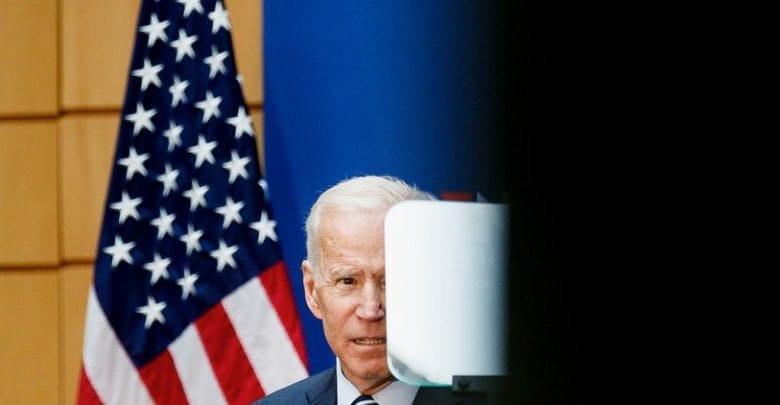
Joe Biden’s Attempt to Get Serious on Foreign Policy
In 1979, Joe Biden, then a thirty-six-year-old senator, nearly a decade away from his first run for the Presidency, flew to the University of Alabama, in Tuscaloosa, to deliver a speech, at the invitation of a student group. “I know you’re all here tonight because you’ve heard what a great man I am,” Biden told the two hundred people in the lecture hall. “Yep, I’m widely known as what they call ‘Presidential timber.’ ” Biden went on, “Why, just earlier tonight, I spoke to a group of students who had put up a great big sign, ‘Welcome Senator Biden.’ And then, when I walked under the sign, I heard someone say, ‘That must be Senator Bidden.’ ” In a 2012 article for The New Yorker, George Packer recounted that joke, as remembered by someone in the crowd, and the ensuing speech, whose subject was the proposed salt II arms treaty. “He spent ninety minutes arguing lucidly, without notes, in favor of reducing the American and Soviet nuclear arsenals,” Packer wrote, of Biden. “At the end of the speech, the applause was loud and long.”
That version of Biden, both loose and lucid, has been seen only intermittently since he announced a third try for the Presidency, in April. He’s been loose plenty, to his detriment—wistful for the days when old-school segregationists roamed the Senate, making cheeky jokes about his habit of getting a little too close to people. To the extent that he’s been at all lucid, though, it’s mostly been while arguing that ousting Donald Trump should be the Democratic Party’s top priority in 2020. That was the case, on Thursday, when Biden delivered a speech on foreign policy, at the City University of New York’s Graduate Center, which no one would have mistaken for loose. “Thank you for listening to a very thorough speech,” Biden said at the end of the forty-five-minute address, ad-libbing from the prepared remarks on his teleprompter.
Biden spoke before a small, seated crowd that leaned diplomatic. (In the elevator on the way out, a young man next to me was texting his selfie with Biden to a WhatsApp group labelled “Official UN Interns.”) The speech had two goals. The explicit goal was to lay out how, if he were to win the election in November, 2020, he would reset America’s standing with the world. The second goal—the implicit one—was to reset his own campaign, or at least to take a deep breath. Foreign policy is an area that Biden considers a strength. In the Senate, he chaired the Foreign Affairs Committee, and his experience is part of the reason Barack Obama put him on the ticket in 2008. After a string of lacklustre weeks, which culminated in Kamala Harris calling out his record on race during a debate in Miami, a foreign-policy speech would give Biden a chance to return to the above-the-fray, front-runner posture he’d tried to assume and maintain when he entered the race. His campaign must have also known that it would give serious foreign-policy people a chance to tout Biden as a serious person. (It did that.)
So what did he say? In a field crowded with and energized by plans (on Thursday alone, Elizabeth Warren released a plan for immigration reform, Kamala Harris released a plan for dealing with rape-kit backlogs, and Pete Buttigieg released a plan to address racial inequality), Biden seems to prefer to offer visions—lighter on details, heavier on framing. “In 2019, foreign policy is domestic policy, in my view, and domestic policy is foreign policy,” he said. Talking about foreign policy also allowed Biden to focus on Trump. “Donald Trump’s brand of America First has too often left America alone,” Biden said. “We only have one opportunity to reset our democracy. After Trump, we have to be prepared to make the most of it.” Biden discussed “security, prosperity, and democratic values,” “forward-looking foreign policy,” and how the United States “must double down on sharpening our innovative edge.” He talked about combatting authoritarianism, the legacy of the great geopolitical contests of the twentieth century, and how Trump “seems to be on the other team.” He talked about the value of the American President’s word, and of the Paris agreement, the Iran nuclear deal, and the problem of North Korea. He talked about migration, taking in more refugees, and sending aid to Central America.
It was a solid, sober, comprehensive speech. What it will do for Biden in his attempts to shore up his position in the primary is unclear. Plans have been a hit among Democratic voters who are following the campaign closely—it’s why much of the rest of the field has followed Warren’s lead in offering up new plans at a regular clip. No one is clamoring for visions. And one topic Biden didn’t discuss much is his own record and experience in the foreign-policy realm. The Democratic primary is unlikely to turn on the candidates’ views toward nato or Vladimir Putin. But it seems a matter of time before Biden will have to talk about his vote for the Iraq War, for example. Already, on Thursday morning, Jay Inslee, the Washington governor running a longshot campaign on a climate-change-focussed platform, said that Biden should have used his speech to apologize for his vote for the war. Democratic-primary voters don’t need to be convinced that Trump’s foreign policy is bad. But talking about the past is the very thing that’s gotten Biden off his footing in the past few weeks. Thursday’s speech suggested that rather than try to bridge the two Bidens—the lucid and the loose—his campaign will have to settle for one alternating with the other, and see what comes.